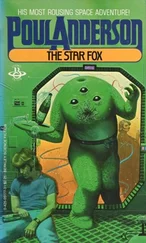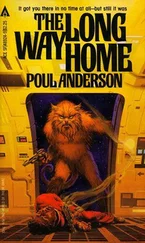Sevenhouses was almost as melancholy a sight from the air as from the ground. The original town stood intact at one edge; but that was a relic, a few stone-andconcrete buildings which piety preserved. Today’s reality had been a complex of industries, dwelling places—mainly apartments—schools, parks, shops, rec. reation centers. The city was not large by standards of the inner Empire. But it had been neat, bright, bustling, more up-to-date than might have been expected of a community in the marshes.
Now most of it was rubble. What remained lay fire-scarred, crowded with refugees, the machinery silenced, the people sadly picking up bits and pieces of their lives. Among them moved Imperial marines, and warcraft patrolled overhead like eagles.
“Just what happened?” Ridenour asked.
Sadik shrugged. “Same as happened at Oldenstead. The Arulians made an air assault—airborne troops and armor, I mean. They knew we had a picayune garrison and hoped to seize the place before we could reinforce. Then they’d pretty well own it, you know, the way they’ve got Waterfleet and Startop. If the enemy occupies a townful of His Majesty’s subjects, we can’t scrub that town. At least, doctrine says we can’t… thus far. But here, like at Oldenstead, our boys managed to hang on till we got help to them. We clobbered the blues pretty good, too. Not many escaped. Of course, the ground fighting was heavy and kind of bashed the town around.”
He gestured. The barge was now well aloft, and a broad view could be gotten. “Harder on the countryside, I suppose,” he added. “We felt free to use nukes there. They sure chew up a landscape, don’t they?”
Ridenour scowled. The valley beneath him had been lovely, green and ordered, a checkerboard of mechanized agroenterprises run from the city. But the craters pocked it, and high-altitude bursts had set square kilometers afire, and radiation had turned sere most fields that were not ashen.
He felt relieved when the barge lumbered across a mountain range. The wilderness beyond was not entirely untouched. A blaze had run widely, and fallout appeared to have been heavy. But the reach of land was enormous, and presently nothing lay beneath except life. The forest that made a well-nigh solid roof was not quite like something from ancient Terra: those leaves, those meadows, those rivers and lakes had a curious brilliance; or was that due to sunlight; fierce and white out of a pale-blue sky where cumulus clouds towered intricately shadowed? The air was often darkened and clamorous with bird flocks which must number in the millions. And, as woodland gave way to prairie, Ridenour saw herds of grazers equally rich in size and variety.
“Not many planets this fertile,” Sadik remarked. “Wonder why the colonists haven’t done more with it?”
“Their society began in towns rather than smaller units like family homesteads,” Ridenour answered. “That was unavoidable. Freehold isn’t as friendly to man as you might believe.”
“Oh, I’ve been through some of the storms. I know.”
“And native diseases. And the fact that while native food is generally edible, it doesn’t contain everything needed for human nutrition. In short, difficulties such as are normally encountered in settling a new world. They could be overcome, and were; but the process was slow, and the habit of living in a few centers became ingrained. Also, the Freeholders are under a special handicap. The planet is not quite—without iron, copper and other heavy elements. But their ores occur too sparsely to support a modern industrial establishment, let alone perrnit it to expand. Thus Freehold has always depended on extraplanetary trade. And the ‘system lies on the very fringe of human-dominated space. Traffic is slight and freight rates high.”
“They could do better, though,” Sadik declared. “Food as tasty as what they raise ought to go for fancy prices on places like Bonedry and Disaster Landing—planets not terribly far, lots of metals, but otherwise none too good a home for their colonists.”
Ridenour wasn’t sure if the pilot was patronizing him in revenge. He hadn’t meant to be pedantic; it was his professional habit. “I understand that the Nine Cities were in fact developing such trade, with unlimited possibilities for the future,” he said mildly. “They also hoped to attract immigrants. But then the war came.”
“Yeh,” Sadik grunted. “One always does, I guess.”
Ridenour recollected that war was no stranger to Freehold. Conflict, at any rate, which occasionally erupted in violence. The Arulian insurgency was the worst incident to date—but perhaps nothing more than an incident, sub specie aeternitatis.
The threat from the savages was something else: less spectacular, but apt to be longer lasting, with more pervasive subtle effects on the long-range course of history here.
Nordyke made a pleasant change. The strife had not touched it, save to fill the airport with ships—and the seaport, as its factories drew hungrily on the produce of other continents—and the streets with young men from every corner of the Empire. The modern town, surrounding Catwick’s bright turbulent waters, retained in its angular architecture some of the starkness of the old castle-like settlements on the heights above. But in the parks, roses and jasmine were abloom; and elsewhere the taverns brawled with merriment. The male citizens were happily acquiring the money that the Imperialists brought with them; the females were still more happily helping spend it.
Ridenour had no time for amusement, even had he been inclined. Plain to see, Admiral Fernando Cruz Manqual considered him one more nuisance wished on a long-suffering planetary command by a home government that did not know its mass from a Dirac hole. He had to swing more weight than he actually carried, to get billeted in a float-shelter on the bay and arrange his background-information interviews.
One of these was with an Arulian prisoner. He did not speak any language of that world, and the slender, blue-feathered, sharp-snouted biped knew no Anglic. But both were fluent in the principal Merseian tongue, though the Arulian had difficulty with certain Eriau phonemes.
“Relax,” said Ridenour, after the other had been conducted into the office he had borrowed, and the Terran marine had gone out. “I won’t hurt you. I wear this blaster because regulations say I must. But you aren’t so stupid as to attempt a break.”
“No, Nor so disloyal as to give away what would hurt my people.” The tone was more arrogant than defiant, as nearly as one could make comparisons with human emotions. The Arulian had already learned that captives were treated according to the Covenant. The reason was less moral than practical—the same reason why his own army did not try to annihilate Nordyke, though Terra’s effort was concentrated here. Revenge would be total. As matters stood, the prisoners and towns they held, the other towns they could destroy, were bargaining counters. When they gave up the struggle (which surely they must, in a year or two), they could exchange these hostages for the right to go home unmolested.
“Agreed. I simply want to hear your side of the story.” Ridenour offered a cigar. “Your species likes tobacco, does it not?”
“I thank.” A seven-fingered hand took the gift with illconcealed eagerness. “But you know why we fight. This is our home.”
“Urn-m-m . Freehold was man-occupied before your race began space flight.”
“True. Yet Arulian bones have strengthened this soil for more than two centuries. By longstanding agreement, the Arulians who lived and died here did so under the Law of the Sacred Horde. For what can your law mean to us, Terran—your law of property to us who do things mutually with our pheromonesharers; your law of marriage to us who have three sexes and a breeding cycle; your law of Imperial fealty to us who find truth’s wellspring in Eternal Aruli? We might have compromised, after Freehold was incorporated into your domain. Indeed, we made every reasonable attempt to do so. But repeated and flagrant violation of our rights must in the end provoke secessive action.”
Читать дальше











